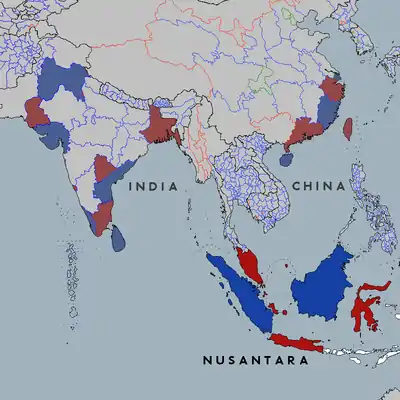新加坡馬來人
新加坡馬來人,也稱巫裔新加坡人 (馬來語:;爪夷文: ) ,為具有馬來血統的新加坡公民,於馬來西亞馬來人的定義相近。雖然馬來人早在公元13世紀就居住在現在的新加坡地區,但大多數新加坡的馬來人源於印度尼西亞和馬來西亞。在萊佛士抵達新加坡之前,許多馬來人生活在屬於柔佛蘇丹國的新加坡。大多屬新加坡馬來人來自馬來群島。截至2020年,新加坡馬來人佔新加坡全國居民人口的13.5%,為新加坡第二大族裔社群。
| 新加坡馬來人 Malay Singaporeans Melayu Singapura ملايو سيڠاڤورا | |
|---|---|
 一对马来人夫妇 | |
| 總人口 | |
| 545,498 佔新加坡居民人口的13.5% (2020)[1] | |
| 語言 | |
| 英語和馬來語; 新加坡式英語 | |
| 宗教信仰 | |
| 相关族群 | |
| 馬來人、爪哇人、Bawanese、馬來西亞馬來人、印尼本地民族、菲律賓人、南島民族 |
1819年後移居到新加坡的馬來人
當萊佛士來到新加坡時,已經有許多的馬來人原居民居住在新加坡。[2][3][4] 1824年新加坡第一次人口普查顯示,馬來人(包括武吉士人)佔總人口的60.9%,為10683人。1826年新加坡人口普查顯示,共有4,790名馬來人,1,242名武吉士人和267名爪哇族人口,總人口為13,750人。

| 種族社群 | 人口 | |
|---|---|---|
| 1824[5] | 1826[4] | |
| 歐裔白人 | 74 | 87 |
| 亞美尼亞人 | 16 | 19 |
| 本地基督徒 | 188 | |
| 阿拉伯人 | 15 | 26 |
| 馬來人 | 4,580 | 4,790 |
| 武吉士人 | 1,925 | 1,242 |
| 爪哇人 | 267 | |
| 華人 | 3,317 | 6,088 |
| 印度人 | 756 | 1,021 |
| 其他 | 12 | |
| 全部 | 10,683 | 13,750 |
馬來人社群組成(1931-1990)
以下數字顯示了新加坡過去60年來各種馬來人社群的組成。其他馬來人族群尤其是爪哇族在1990年出現的快速增長可能是因為在新加坡的印度尼西亞家庭傭工就業人數增加。
| 馬來人亞族群 | 1931 | 1947 | 1957 | 1970 | 1980 | 1990 |
|---|---|---|---|---|---|---|
| 全部 | 65,104 | 113,803 | 197,059 | 311,379 | 351,508 | 384,338 |
| 馬來人 | 57.5% | 61.8% | 68.8% | 86.1% | 89.0% | 68.3% |
| 爪哇族 | 24.5% | 21.7% | 18.3% | 7.7% | 6.0% | 17.2% |
| 巴韋安族(Baweanese) | 14.4% | 13.5% | 11.3% | 5.5% | 4.1% | 11.3% |
| 武吉士人 | 1.2% | 0.6% | 0.6% | 0.2% | 0.1% | 0.4% |
| 班加人(Banjar) | 0.7% | 0.3% | 0.2% | 0.1% | N.A. | N.A. |
(Reference: Arumainathan 1973, Vol 1:254; Pang, 1984, Appendix m; Sunday Times, 28 June 1992)
宗教
.jpg.webp)
根据2020年人口普查,新加坡近 99% 的马来人宣称自己是穆斯林,另有 0.4% 的非宗教人口和 0.8% 的其他宗教人口,如下统计数据所示。
| 宗教 | 人口 (2020) |
比例 |
|---|---|---|
| 伊斯兰教 | 442,368 | 98.8% |
| 基督宗教 | 2,743 | 0.6% |
| 无宗教 | 1,640 | 0.4% |
| 佛教 | 447 | 0.1% |
| 兴都教 | 223 | 0.1% |
| 其他宗教 | 326 | 0.1% |
新加坡绝大多数马来人主要是伊斯兰教的追随者,遵循逊尼派沙斐仪法学传统。
马来人中也存在一个非常小的基督教社区,大约 0.6% 的马来人是基督徒。还有一个小型佛教社区,主要由具有华人和峇峇娘惹血统的马来人组成,甚至还有印度教,主要是具有印度裔(泰米尔人)和Chitty血统的马来人。
文化
大多數新加坡馬來人文化一般與馬來西亞的馬來人有相似的文化。在語言上,大多數在新加坡馬來人講馬來語的柔佛-廖內方言,與馬來半島南部和印度尼西亞的廖內省相似。從印度尼西亞移居至新加坡的馬來人移民的一些老一輩人會說爪哇語。阿拉伯語為馬來人穆斯林所學習的宗教語言。
新加坡馬來人身分地位
新加坡憲法第十三部分,一般條款,少數民族和馬來人特殊地位被認定為新加坡的原住民,第152條:
The Government shall exercise its functions in such manner as to recognise the special position of the Malays, who are the indigenous people of Singapore, and accordingly it shall be the responsibility of the Government to protect, safeguard, support, foster and promote their political, educational, religious, economic, social and cultural interests and the Malay language.
译文:
政府在行使其职能时,应承认作为新加坡原住民的马来人的特殊地位,因此政府有责任保护、保障、支持、培育和促进他们的政治、教育、宗教、经济、社会和文化利益以及马来语。
參見
- 海外印度尼西亞人
参考文獻
引用
- (PDF). Department of Statistics, Ministry of Trade & Industry, Republic of Singapore. 2021 [2023-11-30]. ISBN 978-981-18-1381-8. (原始内容存档 (PDF)于2022-06-11).
- . [2011-08-11]. (原始内容存档于2012-10-19).
- Vasil, R K. . Allen & Unwin. 2000: 96. ISBN 978-1-86508-211-0.
- . History SG. [2017-08-19]. (原始内容存档于2019-05-23).
延伸閱讀
- Dr Syed Farid Alatas, Keadaan Sosiologi Masyarakat Melayu, Occasional Paper Series Paper No.5-97, Association of Muslim Professionals Singapore, 1997
- Dr Syed Hussein Alatas, Prof Khoo Kay Kim & Kwa Chong Guan, Malays/Muslims and the History of Singapore, Occasional Paper Series Paper No.1-98, Centre for Research on Islamic & Malay Affairs, Association of Muslim Professionals Singapore, 1997
- Brown, C.C, Sejarah Melayu or Malay Annals: a translation of Raffles MS 18, Journal of the Malayan Branch of the Royal Asiatic Society, Volume 25, No. 2 & 3, 1952
- Chia Jeannette Hwee Hwee, A History of Javanese and Baweanese of Singapore, Department of History, Thesis for the BA of Arts and Social Sciences, 1993
- Djamour, Judith Malay Kinship and Marriage in Singapore, London: Athlone Press, 1965
- Gibson-Hill, C. A., 'he Orang Laut Of The Singapore River and the Sampan Panjang, Singapore: Malayan Branch, Royal Asiatic Society, 1952.
- Hadijah Rahmat, Kilat Senja: Sejarah Sosial dan Budaya Kampung-Kampung di Singapura, H S Yang Publishing Pte Ltd, Singapore, 2005.
- Haffidz A. Hamid, Mohd Azhar Khalid, Mohd Alami Musa & Yusof Sulaiman, Factors Affecting Malays/Muslim Pupils' Performance in Education, Occasional Paper Series Paper No.1-95, Centre for Research on Islamic & Malay Affairs, Association of Muslim Professionals Singapore, 1995
- Dr Khoo Kay Kim, Elinah Abdullah, Wan Meng Hao (ed.), Malays/Muslims in Singapore: Selected Readings in History 1819–1965, Centre for Research on Islamic & Malay Affairs, Association of Muslim Professionals Singapore, 2006
- Li Tania, Malays in Singapore: Culture, Community and Ideology, Oxford University Press, Singapore, 1989
- Lily Zubaidah Rahim, The Singapore Dilemma: The Political and Educational Marginality of the Malay Community, Oxford University Press, New York, 1998
- Mohamed Pitchay Gani Bin Mohamed Abdul Aziz, Leksikon: Direktori Penulis Melayu Singapura Pasca 1965, Angkatan Sasterawan '50, Singapore, 2005.
- Pang Keng Fong, The Malay Royals of Singapore, Department of Sociology, Thesis for the BA of Social Science, 1984
- Parliamentary Debates of Singapore, Sultan Hussain Ordinance/Kampong Glam Conservation, Volume 57(7), Tuesday 12 March 1991
- Perkins, Jane, Kampong Glam: Spirit of a Community, Singapore', Times Publishing, 1984
- Tengku Mahmud vs. Tengku Ali, Straits Settlements Laws Report 1897 (Vol. 5)
- Tham Seong Chee, Malay Family Structure: Change and Opportunity with reference to Singapore, Seminar Paper No. 13, Academic Session 1993/94, Department of Malay Studies, National University of Singapore
- Zarinah Binte Ali, The Istana at Kampong Gelam: From Royal Ground to National Heritage, Department of Southeast Asian Studies Programme, Thesis for the BA of Arts, 2001/2002
外部連接
- The Singapore Constitution (页面存档备份,存于)
- Minorities at Risk (MAR) Project Chronology for Malays in Singapore
- Malay Heritage Centre (页面存档备份,存于)
- Asas 50
- Year 2010 Census Report Singapore:Key Population Indicators
- Year 2010 Census Report:Key Indicators of Resident Population
- Report on religion in Singapore by Exploitz.com, a public domain information from the US State Department Country Guide
- Singapore Book Of Records
- Demographic Characteristics- Table 5